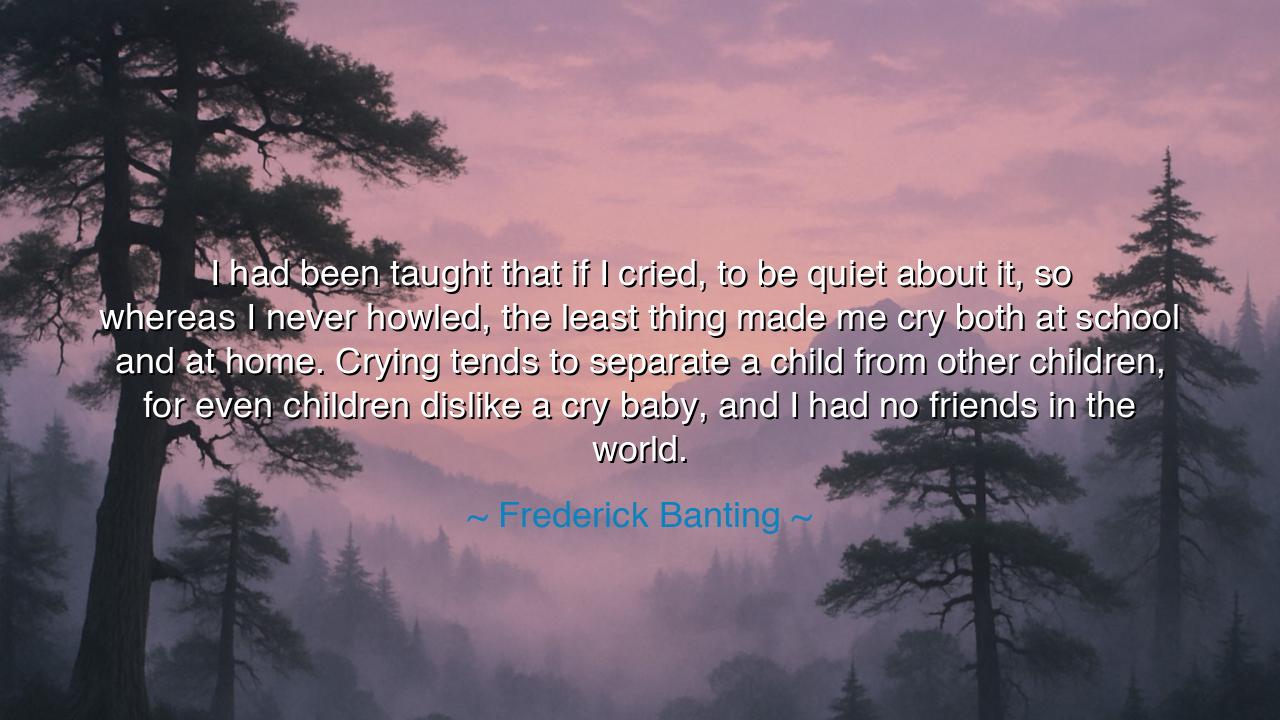
I had been taught that if I cried, to be quiet about it, so
I had been taught that if I cried, to be quiet about it, so whereas I never howled, the least thing made me cry both at school and at home. Crying tends to separate a child from other children, for even children dislike a cry baby, and I had no friends in the world.






In the sorrowful and tender words of Frederick Banting, the man who would one day give the world the gift of insulin, we hear the quiet cry of a lonely child: “I had been taught that if I cried, to be quiet about it, so whereas I never howled, the least thing made me cry both at school and at home. Crying tends to separate a child from other children, for even children dislike a cry baby, and I had no friends in the world.” These words, born from the depths of memory, are not merely a confession of childhood pain—they are a window into the shaping of a soul, into how strength is forged in the crucible of isolation and misunderstood emotion. Beneath them lies a lesson both tragic and profound: that society often demands silence from its most tender hearts, and that such silence, though born of survival, leaves deep marks upon the spirit.
Banting, known to history as the discoverer of insulin—a savior to millions—was first a child unseen, unheard, and uncomforted. The man who would one day heal the world began life unhealed himself. His words recall the harsh code of an older age, when to cry was seen as weakness, when tenderness was something to hide. Thus, he was taught to suffer quietly, to press his tears inward where they could ferment into solitude. He learned, as many have, that emotion suppressed becomes exile—that to feel too deeply, or to show that feeling, is to risk separation. The boy who cried alone would one day stand apart in brilliance—but also in loneliness.
The ancients understood this paradox. The philosopher Heraclitus, called “the weeping sage,” spoke often of the sorrow that accompanies deep perception. He was mocked for his tears, even as his insights shaped the foundations of wisdom. Like Banting, he saw that the world often fears sensitivity, that gentleness is mistaken for fragility. Yet, in truth, it is the gentle who carry the heaviest burdens—for they feel what others ignore. To suppress tears, as Banting did, is to learn restraint; but to never be seen, to never be held, is to risk the freezing of the heart. And yet, perhaps, from that very ice, greatness can be born.
Consider the child Abraham Lincoln, alone in his Kentucky cabin, mocked for his awkwardness, scorned by his peers. He too wept in silence and grew up believing himself strange. Yet it was that same empathic sorrow that would later allow him to guide a nation through its darkest hour. The child who weeps in solitude becomes the adult who understands the pain of others. In Banting’s own life, the isolation of his youth gave birth to compassion—a compassion that found expression not in words, but in the act of saving countless lives through science. From suffering came service; from silence, a legacy that spoke to the world.
Still, Banting’s quote warns us of a great danger—the danger of teaching children to fear their own tears. Crying, though seen as weakness, is a sacred language of the soul. It cleanses, it releases, it connects. When it is forbidden, the heart grows hard, and connection becomes difficult. Banting’s loneliness was not a flaw of character, but the result of a culture that prized stoicism over understanding. Even children, he notes, “dislike a cry baby.” Thus, cruelty is passed from generation to generation—not out of malice, but ignorance. In teaching strength, we too often teach suppression. In denying tears, we deny humanity.
The true wisdom hidden within Banting’s lament is that pain, when embraced, can become purpose. Though he had “no friends in the world,” he did not allow bitterness to consume him. Instead, he turned inward, transformed his loneliness into focus, his quiet tears into quiet perseverance. From that soil of sorrow rose the flower of healing—the discovery of insulin, an act of compassion that continues to save lives to this very day. The man who once had no one became the one who saved everyone. Thus is proven the paradox of the human soul: that those who suffer most deeply often bring the greatest comfort to others.
So, my children of tomorrow, learn from this: never shame the tears of the young, nor silence the voices of the sensitive. The cry of a child may one day echo through history as the heartbeat of a healer, a thinker, a creator. Strength is not the absence of tears—it is the courage to feel and still move forward. If you would raise strong hearts, let them cry; if you would nurture greatness, let it grow in compassion. For every Banting begins as a child alone, and every tear shed in secret carries within it the seed of a miracle yet to come.






AAdministratorAdministrator
Welcome, honored guests. Please leave a comment, we will respond soon